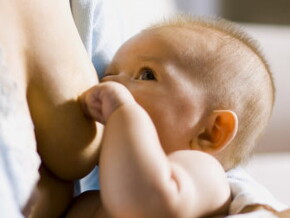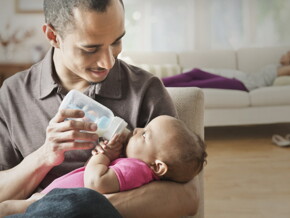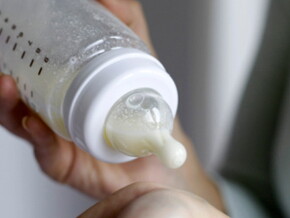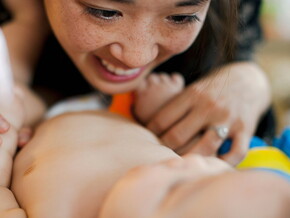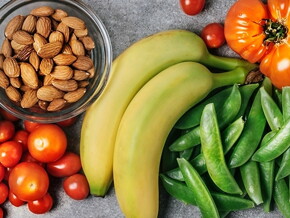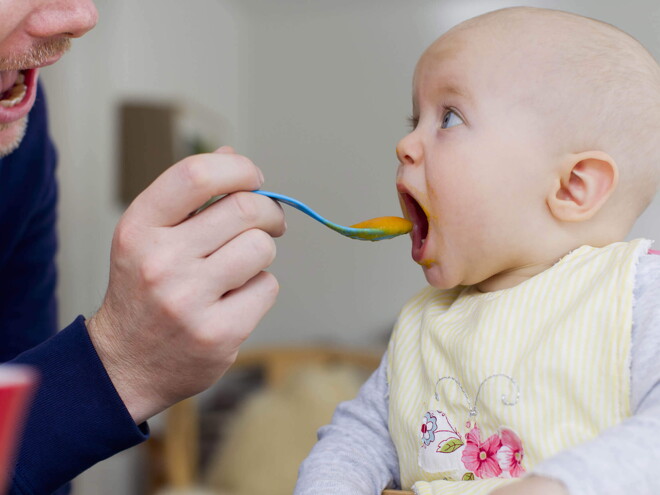
The good news is that you can help reduce the risk to your child by planning what allergenic foods you feed your baby, and when. Here is some information on breastfeeding and food allergies as well as ways to reduce the risk of food allergy in babies.
How to help reduce the risk of your baby developing food allergies
Breastfeed exclusively for the first six months. Learn more about the benefits of breastfeeding.
There is no need to avoid certain foods while breastfeeding as there is no evidence that avoiding foods such as milk, eggs, peanuts, fish, or other potential allergens will prevent your baby from getting allergies. By breastfeeding, you may help reduce the risk of food allergies in your baby.
- If you need to stop breastfeeding or supplement breast milk, speak to your healthcare professional about an iron-fortified infant formula with 100% whey protein that is partially hydrolyzed with clinically supported benefits.
- At around 6 months, when your baby is ready for solid foods, feed your baby foods that include the most common food allergens (cow’s milk, egg, peanut, tree nuts, sesame, fish, soy, and wheat.
Introducing allergens to baby
Food allergies in babies can be scary, but the good news is that by feeding your baby foods that commonly cause allergy early and often, you can reduce the risk of your child developing a food allergy. Help reduce the risk of your baby developing a food allergy by introducing allergens to baby in an intentional way.
When your baby is around 6 months old and able to sit up well without support, you can start to introduce solid foods. Here are some tips for introducing some of the common allergens like peanuts, tree nuts, soy, eggs, shellfish, fish, or wheat.
Here are some tips for introducing allergens to your child:
- Give your baby the allergenic food for the first time when you are at home. The risk of a baby having a severe reaction the first time they eat a food is very low.
- Add new foods when your baby is in a good mood, so they are more likely to have a positive association with the food.
- Introduce the new food at a time when they will be awake for about 2 hours afterwards so you can monitor their response over the course of the day.
- The food should be a smooth consistency to prevent choking, and you should feed your baby so that there is less food mess that may cause irritation on the skin that could be mistaken for allergy.
- Add only one food at a time and wait two days before introducing another new food so that you can more easily identify which foods cause an allergic reaction, if any.
If you have any concerns about a food allergy in your baby, speak to your baby’s doctor. For more information on baby's first foods, check out Introducing Solids to Your Baby.
How to spot an allergic reaction
Allergic reactions typically appear within minutes or hours of exposure.
Symptoms can be mild such as moderate hives.
A more serious reaction might include:
- Skin reactions (eczema, widespread hives, or rashes).
- Swelling of the lips, eyes, or face
- Respiratory concerns (like repetitive cough or wheezing).
- Gastrointestinal intolerance (such as vomiting, abdominal pain and diarrhea that may be tinged with blood).
- A change in skin colour (pale, blue)
- Sudden tiredness/lethargy/limpness
If you suspect your baby has an allergy, see your doctor as soon as possible.
References
Abrams EM, et al. Dietary exposures and allergy prevention in high-risk infants. Canadian Paediatric Society. Paediatr Child Health. 2021;26(8):504-505.
Food Allergy Canada and Canadian Society of Allergy and Clinical Immunology. Early Introduction of Allergens: FAQs for Families. 2019. EarlyIntro_Web (foodallergycanada.ca) Accessed August 2023.




